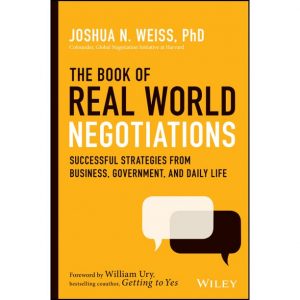We negotiate all the time. When it really matters it tends to be that we are in a situation that is new and different. It takes practise and experience to learn from mistakes.
Joshua N. Weiss has put together cases demonstrating different situation and how they were carried out. The stories vary from the outset and power dynamics but they resemble situations that you may face in the future.
One of the big learnings is that your mindset will define the way the negotiations will go and the expected outcomes. If you’re going in with the typical win-lose way of thinking it will limit your options.
A commonly held mistake is to consider negotiations as a process of compromising something of significant value for closing the deal. Weiss calls this type of negotiation the lazy approach.
A better approach is to split the difference where it’s possible to move forward and both parties are just a little bit unhappy.
A sad myth is a notion that you have to deceive or manipulate. This tries to find exploits for discomforting the other party and taking advantage of the situation. This is a very short-term view and you can expect to get payback later.
When you are considering negotiations as something that only weak parties do and you force your way thru it does not differ much from the previous conception.
If you’re having a long-term relationship you tend to be careful not crossing the fine-line where you permanently damage the relationship. Getting it all for short-term gains, even if you could, at the expense of the long-term is very short-term thinking that does not forecast a lasting relationship.
The book presents five principals that guide you through the process. You start by investing in preparation and not planning. The latter is a rigid and closed-mindset approach that has difficulties to adapt to the changes and requirements of the actual negotiation.
The second principle talks about approaching with a mutual gains mindset that cultivates the relationship. You will need all the goodwill when things get tough.
If you have ever been in a tough spot creative problem solving comes handy when you are really committed to finishing with a successful outcome. Creative problem solving is not compromising where the focus is finding a solution (any really just to move on). Creative problem solving circumvents the roadblocks and looks the real objectives from an entirely different, unexpected perspective.
Managing emotions plays a huge role and the better you can handle yours but even your counterparty’s emotions more effective your process becomes.
The final principal reminds to look for hidden dimensions that are not spoken about but influence or even drive the real objectives.
Each case example describes the situation, walks through the negotiation process and outlines the lessons learned. They also introduce valuable concept such as Post Settlement Settlement by professor Howard Raiffa where after you have reached an agreement you ask a simple question: “Is there any way that we can make this agreement better for both of us?”
By revising the new agreement you may be surprised to find that there are still benefits that have not been materialised and additional value could be gained by implementing them as well.
If you’re not familiar with ZOPA (zone of possible agreement) and BATNA (best alternative to a negotiated agreement) maybe it’s time to brush-up your negotiation skills?

